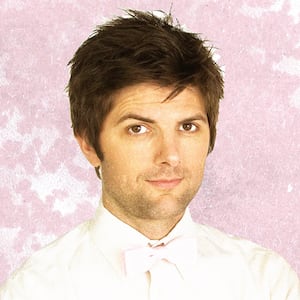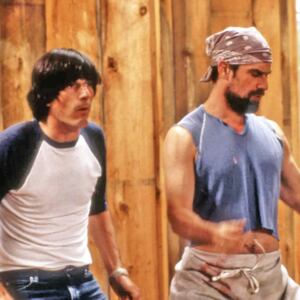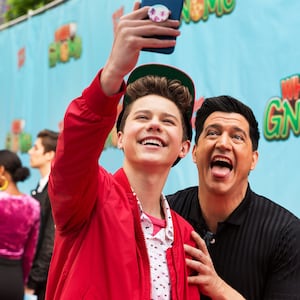Ken Marino knows that he’s often called upon to play one of two archetypes. From his earliest days as a member of the NYU sketch group The State to his roles in films like Wet Hot American Summer and Wanderlust and TV shows like Eastbound & Down and The Other Two, he mostly swings between insecure buffoon and “straight-up asshole.” But no character better captures his particular comedic gifts than Ron Donald of Party Down, which returns this Friday, Feb. 24, on Starz for its long-awaited third season—13 years after it was canceled.
In this episode of The Last Laugh podcast, Marino talks about what it was like to reunite with Adam Scott, Jane Lynch, and the rest of the Party Down crew and reveals what fans can expect from the new batch of episodes. He also reflects on almost losing out on his roles in Party Down and Wet Hot to Steve Carell and Sam Rockwell, respectively, the decision to take things into his own hands as a screenwriter with movies like Role Models, and how he views his place in the comedy world after 30 years on screen.
Marino’s first instinct as an interview subject is to go for the laugh. At the first mention of his Party Down co-star Adam Scott’s name, he jokes, “Don’t like him!” Moments later, he concedes, “The truth is, I love Adam. And I have a bit of a crush on Adam. Like, what’s the deal with this guy? He’s just a really talented, handsome guy and then he’s also a good human being? What gives him the right to do that?”
In addition to Marino and Scott, the whole Party Down gang is back for this new season—with one big exception.
“Yeah, it sucked,” the actor says about the decision to proceed without original cast member Lizzy Caplan, who was stuck in New York shooting her FX series Fleishman Is in Trouble when Season 3 of Party Down was in production in L.A. “Lizzy was a huge part of why the first two seasons of Party Down were so special and worked so well. So it was a real bummer.” He’s still holding out hope that if they get the chance to come back for a fourth round, Caplan will be able to return to the fold.
It’s something of a miracle that Party Down is getting a third season at all after Starz canceled the show in 2010 due to dismal ratings. But over the intervening years, the show’s reputation only seemed to grow—mostly thanks to the continually rising profiles of its previously little-known stars, like Lynch, who had yet to star in Glee, and Martin Starr, who was years away from Silicon Valley. Marino himself has had more than 80 acting credits to his name in the 13 years since the show went off the air, including another high-profile reboot of Wet Hot American Summer on Netflix and seven seasons of Childrens Hospital on Adult Swim.
“When we finally got wind that we were actually doing it, of course I had to go back and into my file cabinet where I have all the folders with the breakdowns of all the characters that I do,” Marino jokes. “And I pulled out the folder of Ron, blew the dust off, and opened it up. Man, it took me six, seven, eight months to really get back into the headspace of who Ron is and what he’s all about. And then once I did that, I had to take another 11, 12 months to sort of just stay in character so I understood his mindset.”
Only after all of that, Marino deadpans, was he finally “locked in.”
When I ask if his preparation involved sleeping in a van, he replies, “I slept in a van, I slept on top of a van, I slept under a van, I slept with a van, which was the most uncomfortable part.”
From there, Marino—mostly—answers my questions seriously.
Below is an edited excerpt from our conversation. You can listen to the whole thing by subscribing to The Last Laugh on Apple Podcasts, Spotify, Google, Stitcher, Amazon Music, or wherever you get your podcasts, and be the first to hear new episodes when they are released every Tuesday.
Going back to when the show started 13,14 years ago, how did the opportunity to play this character come your way?
I was lucky enough to have been given a part by [Party Down creators] Rob Thomas and Dan Etheridge and John Enbom, who were all working on Rob’s show Veronica Mars. While we were on set, Dan was telling me about this script Party Down that they had shopped around. It was set up somewhere, but then it didn’t go, and he was telling me about the premise. And so between setups, he gave me the script. I read it and I immediately went back to him and said, “Look, if you ever audition for Ron, please keep me in mind. I would love to audition for Ron because I have a take on him.”
I saw somewhere that you might have Steve Carell getting The Office to thank for getting the opportunity to play this character, that they were circling him for it at some point?
Yes, I think that was the case. Originally it was going to star Paul Rudd [in Adam Scott’s role] and they were circling Steve Carell [for Ron]. And then Rudd’s star shot up and Carell got The Office. But the truth is, I don’t know what happened with Rudd. I don’t know if he’s even acting anymore… but I wish him well.
You said you had a take on Ron, that you felt like you got him in some way. What was it about him that you felt like you understood or could bring to that character?
I just felt like if you tap into the earnestness and the heart and the truthfulness of his want to succeed, then he wasn’t just an asshole. I felt like you could enjoy him and not just hate him. You can feel for him.
I don’t want to say that you always played a version of the same guy, but I think you would probably agree that you have a type that you have played a lot. How would you describe the character that you are most often asked to play, that people come to you and think of you for?
Well, it would really depend on what point in my career I was in.
You feel like there’s been an evolution?
Yeah. Earlier in my career, after I left The State, I was playing a lot of the nice-guy boyfriends that had some weird thing that made the female character break up with him. And then at a certain point, I think right around Wet Hot American Summer, I started tapping back into more of the character-y parts that I got to do in The State. And I enjoyed that more; it was more fulfilling for me. And what I found was, my wheelhouse was either straight-up asshole—I could be a real jerk, I was pretty good at that—and then I also liked to play people who are slightly more misunderstood, who come off as jerks but are good-natured or have a big heart. I like playing in that ballpark of those types of characters and to modulate how much of a full asshole they are as opposed to how much of a good person they are, and they’re just awkward or socially not capable of communicating their true feelings. I definitely have a comfort zone, but I do like to swing it the other way and just play straight-up assholes as well.
I mean, you seem like a very nice guy. Do you feel like there’s any part of yourself that you’re tapping into, whether it’s the asshole side or the sort of misunderstood side?
I suppose it all comes from a real part of something in me. And I guess there are elements of all of that inside me. I’d like to think that you have to have all of those parts of you and then if you’re living in real life, you keep everything at bay or you realize you don’t want to be an asshole.
That’s kind of like what Larry David talks about, where the character of Larry David on Curb Your Enthusiasm is what he would want to say in certain situations but doesn’t actually say in real life.
Yeah, I guess for me, it’s not like when I play an asshole—those aren’t things that I would want to say, but I know I have the ability to say them if I’m pushed into a corner or if the angel on my shouldn’t isn’t saying, “Hey, chill out.” So I think we all have those different parts in us and then when you’re acting, you tap into one of those and you just make that the star of the show.
Coming back to Party Down after so long, I know that you and Adam and others have joked about how few people watched it when it was on the first time around. And it’s kind of amazing that it’s had this life after it was on. How are you managing your own expectations for what Season 3 will be? Because there’s so much excitement, so much buzz, but at the same time, it wasn’t a show that was popular when it was on the first time.
Well, much like I don’t have an understanding of how I’m perceived in this industry and in this town, I don’t have a full understanding of how Party Down is perceived or understood in this town. And so I have no expectations. Success or failure, that doesn’t matter to me. My mental approach to doing any project is: Is it something that brings me joy? Is it a group of people that I want to spend time with? Do I really like the material and would I enjoy it? And whatever happens after that is beyond my control and not something I really think about.
It’s interesting to hear you say that you don’t know how you’re perceived in the business. Because from my perspective on the outside, you work so much, you’re in so many hilarious projects that I love. Do you feel the need to understand how you are perceived in the business? Or do you just kind of put that aside and not even worry about it?
It’s an interesting question. I mean, I don’t know. There’s a part of me that, at times, would like to know how I’m perceived. Because I’ve been around and doing this since The State, which is ’93. So I’ve been around a long time and there have been times when I’ve been doing a lot of stuff and there’ve been times when I was just hustling and struggling and trying to get the next gig. And now I’m in a place where if I go back and look at my body of work, I’m like, “Oh wow, I’ve been involved in some things that I’m super proud of and I’ve been involved in some things that people seem to really like.” And cult-y kind of things, which are my favorite kind of things. So I don’t know, I can’t help but think about it from time to time. The ego part of me, I guess, is like, “How do people think about me?” But I’m in a more comfortable place, in a better place, I think, mentally, when I’m not thinking about that. And I actively try not to think about that because I don’t know the answer to it anyway.
Yeah, I was wondering about the whole “cult hit” thing because I think Party Down is a pretty quintessential version of that, and you’ve been in a lot of them. And you said that those are your favorite things, so you don’t have any feelings like, “Oh, I wish I was in things that were not cult hits, but rather hit hits”?
I only wish that for financial reasons. The freedom I’ve had to do the things that I consider the coolest, the things that I consider my favorite, because I get to play characters that are fun and I get to be around other people that are really talented and funny and make me laugh and the material makes me laugh—a lot of those things are labors of love, or things that are under the radar, like The State, Wet Hot American Summer, Burning Love, Childrens Hospital, The Other Two…
You’re basically naming all of my favorite things.
Well, I appreciate your taste. I’ve been given that gift of being able to do all those things because I haven’t had the other gift of being on something that goes for six years and feeling like “now I’m set.” So the trade-off—and I think it’s a pretty damn good trade-off—is I get to be in some really cool projects. And I get to play all these different characters and different variations of me, and I get to take big swings. And at the end of the day, that’s a nice job to have.
Listen to the episode now and subscribe to The Last Laugh on Apple Podcasts, Spotify, Google, Stitcher, Amazon Music, or wherever you get your podcasts, and be the first to hear new episodes when they are released every Tuesday.




